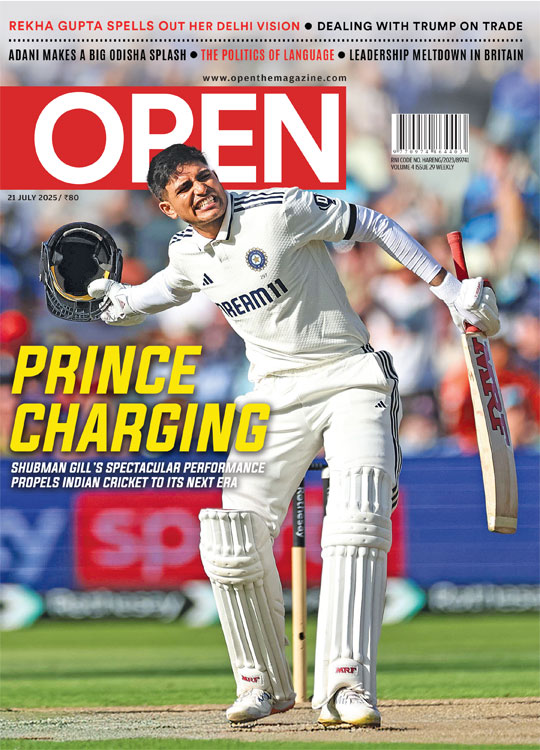Akhilesh vs Mulayam: Mortal Combat
Is the Yadav family of Uttar Pradesh headed for a war of attrition?
 Kumar Anshuman
Kumar Anshuman
 Kumar Anshuman
|
05 Jan, 2017
Kumar Anshuman
|
05 Jan, 2017
/wp-content/uploads/2017/01/UPYadav1.jpg)
In the Samajwadi Party, confusion reigns supreme. Speak to any SP leader in Lucknow, and he is just as clueless as the rest of the workers milling around—in protest or just to wait—the residence of either Chief Minister Akhilesh Yadav or party founder Mulayam Singh Yadav, the battle between whom has torn the ruling party of Uttar Pradesh apart. The moment they hear of yet another patch-up meeting between Yadav Jr and his father, they start singing odes to the need of party unity for the future of the state. In dramatic developments over the turn of the year, the son appears to have rallied enough support within the SP to force its patriarch into a climb- down, making him rescind an order for his suspension from the party, but how all this will eventually play out remains a matter of speculation.
Jameel Ansari, a party worker from Ghazipur, says he reached Lucknow on the morning of December 31st soon after he heard of Akhilesh Yadav’s six-year expulsion. Since then, Ansari has followed a routine: his day starts at 8 am, when he leaves his guest house to take position outside 5 Kalidas Marg, the Chief Minister’s official residence, awaiting the arrival of his leader at 9 am from 4 Vikramaditya Marg, a recently acquired home. “Jai Akhilesh!” he cries as the vehicle approaches, trying to get as close as he can. He does this each time the convoy makes it way here. For the rest of his time, he tries to sneak into the frame of TV news cameras covering the country’s hottest family feud.
“Nothing seems to be final as of now,” laments Ansari, of the latest reconciliation effort, “Whatever the decision, they should stick to it rather than changing it every second day. We are confused. Right now, the party has no leader, no candidate. We don’t know if it will remain Samajwadi Party or become something else if the Election Commission decides to freeze the party symbol.”
With just a month to go before UP goes to the polls, the two wheels of that bicycle have been wrenched so hard in different directions that disarray rules the rank-and-file. There have been so many flip-flops among the warring sections led by Mulayam and Akhilesh that few even know who the party president at any given juncture is. Since either faction has ousted members of the other from the party, everyone is bewildered. “There is nothing to say on this except that we are damaging ourselves and giving the opposition a chance to emerge,” says veteran party leader and Rajya Sabha MP Beni Prasad Verma. The glum faces speak of exasperation. This was not something that happened overnight, and Samajwadi members had hoped that all differences would be resolved in good time to face the electorate. It was not to be.
Just a month before UP goes to the polls, the two wheels of SP’s symbolic bicycle have been wrenched so hard in different directions that disarray rules the rank-and-file
A feud was brewing ever since Akhilesh Yadav became Chief Minister in 2012. At the time, Mulayam’s brother Shivpal Yadav had opposed his nephew’s appointment, asking the founder of the 25-year-old party to assume the mantle himself since the electoral mandate was for him. Other party leaders and some first-time MLAs, however, were in Akhilesh’s favour, and he was the one who took oath. “Actually Shivpal was trying to be the second choice if Mulayam refused, and with Akhilesh getting the top post, Shivpal now carries a grudge [for being overlooked],” in the words of Ram Gopal Yadav, a Rajya Sabha MP and Akhilesh supporter, speaking to Open last November. In compensation, a number of ministries were allotted to Shivpal, including the powerful PWD portfolio, and he was allowed to function without any interference from Akhilesh.
In the early part of Akhilesh’s tenure, he found his office being remote run by his father who wanted to exercise control over his government by dictating not only policy decisions but also key official appointments. Insiders reveal that the Chief Minister was uncomfortable with this, but had to submit to the command of Netaji, as Mulayam is popularly called.
The first sign of trouble appeared after the 2014 General Election in which the SP won only five seats, all of them by Yadav family members. An upset Mulayam blamed Akhilesh for the dismal show and started taking digs at him at public gatherings. In deference to Netaji, the Chief Minister would respond with a smile whenever anyone asked about the barbs aimed at him. “He is my father and like every father he has a right to guide his son,” he would say. He maintained this stance for a long time, openly revising it only in September last year: “There are some people around Netaji who are constantly guiding him against me and forcing him to take decisions,” he said, “While I have full respect for Netaji, I won’t allow any outsider to come between father and son.”
The Chief Minister had named no one, but he was referring to Amar Singh, who was re-inducted into the party last May, unsettling many members—including Akhilesh. The villains of the split have since become clear on both sides. Yadav Jr’s camp blames Amar Singh for the unrest in the party, while Mulayam Singh supporters accuse Ram Gopal Yadav of ruining the party for his own political ambitions. “[Ram Gopal] is working with BJP and trying to save himself from the CBI,” alleges Shivpal Yadav of the leader who has been suspended from the party thrice in the past two months at Mulayam’s behest.
While Akhilesh was in Jhansi, Mulayam and Shivpal released a list of 325 candidates, leaving out some of the Chief Minister’s aides. The list was read out by Mulayam himself so that no one doubted his approval
The senior leaders on Akhilesh’s side have scathing words for Amar Singh. “Everything could have been averted by removing that one person, but he is taking advantage of Netaji’s softness,” says Naresh Agarwal, senior leader and Rajya Sabha MP. When Mulayam gave Amar Singh a Rajya Sabha ticket in mid-2016, an annoyed Akhilesh and his team tried to ensure his defeat. Right after the June election, Amar Singh complained to Mulayam about how Sunil Yadav Sajan, an MLC of the Akhilesh camp, had tried to get party MLAs not to vote for him. But Amar Singh had won, and the matter was considered closed. But that was not the end of it. Shortly afterwards, Shivpal announced the SP’s merger with Mukhtar Ansari’s Quami Ekta Dal (QED). This was done without even consulting Akhilesh, the party’s state president as well as Chief Minister. In the SP’s next parliamentary board meeting, Akhilesh used the numbers on his side to call off the union. This set off a series of mutual expulsions by both camps of the party.
Last September, Mulayam removed Akhilesh as the party state president and appointed Shivpal in his place. The CM responded by stripping Shivpal of his ministerial portfolios. Tit-for-tat ejections from the party and government were to follow. On October 24th, Akhilesh and Shivpal had a heated exchanged of words in public, each charging the other with destabilising the party. There was a momentary truce in the beginning of November, when Ram Gopal Yadav’s suspension was revoked by Mulayam and SP workers heaved in relief that all was well within the Yadav clan.
Behind the scenes, however, while the Winter Session of Parliament was underway in New Delhi, a script was being drafted for a palace coup in Lucknow. It was the son planning to take charge of the party from his father and emerge as a leader in his own right.
SOMETIME BACK, Akhilesh had got angry with Amar Singh for comparing him with Mughal Emperor Aurangzeb (1618-1707), who had dethroned his father in 1658 CE to claim the empire. The difference, the Chief Minister believes, is that he is being forced by circumstances to act the way he is for the sake of the party and the clan. Close aides of Akhilesh reveal that Ram Gopal Yadav had urged him to keep a list of poll candidates ready for announcement. In Delhi, Ram Gopal spoke to several senior SP leaders and convinced many to side with the son if a choice had to be made. “Our leader Akhilesh Yadav was clear that we won’t make the first move and wait for their mistakes,” says an MLC close to the Chief Minister.
It was on December 28th that the provocation came. While Akhilesh was in Jhansi for the inauguration of some new projects, Mulayam and Shivpal called a press conference and released a list of 325 candidates, leaving out some aides of the Chief Minister. Names such as Atiq Ahmed, whose candidacy Akhilesh was opposed to, were on that list with Shivpal’s backing. The list was read out by Mulayam himself so that no one had any doubt of his approval. Informed of this in Jhansi, sources say Akhilesh just said he would speak to Netaji. On his way back from that town, he spoke to Ram Gopal Yadav and called for a meeting of his supporters. By the next evening, they had released a parallel list of 235 candidates as ‘the final’ one for the UP polls. The Yadav versus Yadav war was only to escalate after Shivpal released another list of 68 candidates a few hours later, with ‘show cause’ notices issued to Ram Gopal and Akhilesh for their rebel list.
Overnight, new posters of Akhilesh welcoming leaders to Lucknow appeared, describing him glowingly as ‘Loha Tap Kundan Bhaya’(iron molten to form gold)
To consolidate support for the Chief Minister, Ram Gopal reached Lucknow and announced a national convention of the party on New Year’s Day. On December 30th Mulayam suspended not just Ram Gopal—who was used to it by now—but even Akhilesh from the SP, saying that for the party to convene without its president’s nod was a violation of its constitution (instead, he declared a convention on January 5th). Such a drastic move, it turned out, was exactly what the son’s camp had expected. Akhilesh called a meeting of all party legislators at his residence on 31st December. In a clear show of support, more than 200 MLAs of the party attended it. This was all he needed. The Chief Minister took their signed affirmations of trust in his leadership and went to meet Mulayam, who was left with no option but to revoke the twin suspensions and let them allot party tickets.
According to a leader present on the occasion, Netaji asked his son to call off the next day’s national convention. “Akhilesh was non-committal on this and said that he would respond only after talking to other leaders,” says this leader. Back home, Akhilesh’s team was in no mood to accept any proposal. “We all told him not to fall prey to this new tactic of Shivpal Yadav as we won’t be able to do anything once elections are announced,” says another leader close to Akhilesh.
To underscore the camp’s defiance, Ram Gopal announced that the convention would take place as scheduled and all of Akhilesh’s supporters were expected to be there. By that night, most senior leaders of the SP had landed in Lucknow. Among them were Rajya Sabha MPs Kironmoy Nanda, Revati Raman Singh and Naresh Agarwal. The latter’s son, state minister Nitin Agarwal, was already in the Chief Minister’s camp.
Overnight, new posters of Akhilesh welcoming leaders to Lucknow appeared in the state capital, describing him glowingly as ‘Loha Tap Kundan Bhaya’(iron molten to form gold). The man of the occasion awoke early that morning, as sources say, and asked his barber for a quick shave. He thanked all his supporters present there, touched the feet of his mentor Ram Gopal Yadav, and headed for the Janeshwar Mishra Park venue to claim victory. Akhilesh was declared the SP’s national president in place of Mulayam. Shivpal Yadav was ejected as state party president and Amar Singh was shown the exit.
While all this was happening, Mulayam was sitting with Beni Prasad Verma, Shivpal Yadav, Om Prakash Singh and other old- timers. “Ladka jiddi hai,” (the boy is fussy),” Mulayam told Beni with moist eyes.
Yet another round of mutual suspensions was to follow, but by now, Mulayam and Shivpal were on much weaker ground. All across Lucknow today, SP posters bear the images of Akhilesh, Mulayam and Ram Gopal, but Shivpal is not to be spotted. The latter’s party office nameplate has been taken off, the new state president Naresh Uttam has taken charge of it.
Both fractions have approached the Election Commission with claims to the party name and symbol in the upcoming elections. Some leaders like Azam Khan have been trying to avert a split, hinting at a defeat at the hustings, but the very mention of Amar Singh and Ram Gopal Yadav puts paid to these efforts, say those in the know.
Akhilesh’s camp blames Amar Singh for the unrest. “Everything could have been averted by removing that one person,” says party MP Naresh Agarwal
The split, now a mere formality, has severely affected the electoral prospects of the SP. Even if the party goes to the polls as one, much damage has been done. If separate candidates contest seats, it will be far worse. The party can count on its loyal Yadav votes, but its other support base of Muslims—who account for 19 per cent of the UP electorate and form the other half of the party’s winning M-Y combination—are jittery about voting for it now. Uneasy about a potential BJP victory in the state, especially after its well-attended rally on January 2nd in Lucknow, they are unsure if voting for SP would be a waste. “It is going to be a setback for Muslim voters,” says Gyas Asad Khan, principal of Shibli College, Azamgarh. “If they decide to go separately, then Muslims might look for other options. Frankly, Muslims are not ready to take a chance after the 2014 Lok Sabha results.”
Another complicating factor is that Akhilesh has not presented himself as a champion of Muslim causes in the manner Mulayam used to. “Whatever the situation, Netaji is still a leader of Muslims and they vote SP only because of him,” says his loyalist Beni Prasad Verma, “I can only say that this battle is not for who forms the next government in case the party splits, it is a battle of supremacy within the family, and no one is going to benefit from that.”
On its part, the Akhilesh camp is aware of Muslim apprehensions and is trying to lay them to rest. On December 18th, the Chief Minister distributed Samajwadi Pension certificates to 2,000 destitutes of the minority community as an outreach measure. This is too little too late, say some observers. “Muslims vote on emotions rather than who does what for them, as no one has met their expectations all these years,” quips Asad Khan, warning that the BJP stands to gain from the family feud.
That fear is reflected in worries expressed by SP’s Azam Khan over a division of minority votes. “These are not good signs and Muslims are very sad over the developments,” he says, “We are making communal forces stronger in this fight.” There are some who think Akhilesh is still the leader who could keep the BJP from achieving power in UP. “Only he can take on the BJP, and if he emerges stronger in the ongoing fight, Muslims can trust him for the larger good,” says Maulana Khalid Rasheed Firangi Mahli. “The SP is still a better choice over the BSP, which is losing its core votes of Dalits and couldn’t win a single Lok Sabha seat.”
Which way Yadav votes go in case separate SP candidates are put up is even harder for anyone to predict. Much would depend on ground forces. The ruling clan’s bastions of Etawah, Mainpuri and adjoining regions have different family members in control. Mulayam and Shivpal still hold organisational sway in these parts. Those close to Akhilesh are mostly MLCs of his choice and how well they can appeal for votes on their own is largely untested. “Yadavs were just a vote bank before Mulayam. It is he who made us powerful over the years,” says Narhari Yadav, 52, an ardent Mulayam supporter from Mainpuri. “Besides it would be counted as immoral for Akhilesh to overthrow his father, the man who gave him everything.” In Jaswant Nagar, an Assembly constituency represented by Shivpal Yadav, shopkeepers had downed their shutters in protest the day their leader was divested of his portfolios. Ram Gopal Yadav, however, does not see this as an omen. “Last time Shivpal won by more than 50,000 votes,” he says, “This time he would lose by the same margin.”
The Yadav clan’s infighting has come as a boost for the Bahujan Samaj Party (BSP), whose leaders expect to draw Muslim voters away from the SP by projecting their chief Mayawati as the only leader capable of defeating the BJP. With the BSP’s core voter base of Dalits accounting for 21 per cent of the state, en masse backing by minorities is all it would need to form UPs next government. At a press conference called on January 3rd, Mayawati appealed directly to them. “Muslim voters should not waste their votes by giving it to a divided SP or Congress,” she said. “There are several seats that BSP could win if Muslims and Dalits vote together.” The party hasn’t yet announced its final list of candidates, but Mayawati said that she has given 97 tickets to Muslims, the highest ever by her party. “There is no doubt that Muslims are coming to us,” says senior BSP leader Sudhindra Bhaduaria. “Anyone who is opposed to the BJP will come to us.”
The BJP sees itself as the obvious beneficiary of the SP disarray. “In the last five years, they have ruined the state,” says BJP state president Keshav Maurya, referring to the SP. “Now they are a ruined party with no campaign on the ground. We already have our campaign and confidence in place after Prime Minister’s Modi’s revolutionary attack on black money and corruption. Only we have the trust of the people.” There is little doubt that the BJP is far ahead of its rivals in terms of electoral preparedness. In multi- cornered contests, any division of votes among traditional voters of the BSP and SP would make a BJP victory far easier.
All this makes the going tougher for Yadav Jr. Nevertheless, the Chief Minister seems determined to pitch his credentials as a leader with a difference, a breakaway from the SP mould. Professor AK Verma, who heads the Political Science Department at Chirst Church Collge, Kanpur, doesn’t see the SP’s current turmoil hurting its M-Y equation. “All this shadow boxing will come to an end and people will realise that Akhilesh is the real leader [of the party],” he says. “Muslims and Yadavs have no option better than Akhilesh, and once he takes over completely, all cadres and voters will side with him.” According to him, the BSP has always attracted some Muslim votes (18 per cent in the 2014 General Election), but most tend to go to the SP.
The seven phase elections in UP will begin on February 11th. Akhilesh had planned a Vikas Yatra, but that has been forgotten in the melee. Talk of an SP alliance with the Congress has added to the perplexity of party workers. And a formal split could occur too. If the EC freezes the cycle symbol, Akhilesh will have a crisis on his hands. Time is running out for the Chief Minister who wants to be re-elected as his own man.
About The Author
CURRENT ISSUE
MOst Popular
3

/wp-content/uploads/2025/07/Cover-Shubman-Gill-1.jpg)













More Columns
Why India's Rich And Famous Choose To Settle Abroad Short Post
‘Fuel to Air India plane was cut off before crash’ Open
Shubhanshu Shukla Return Date Set For July 14 Open